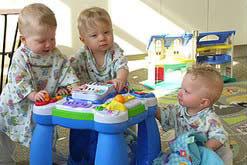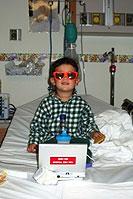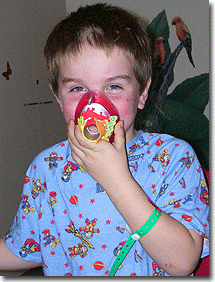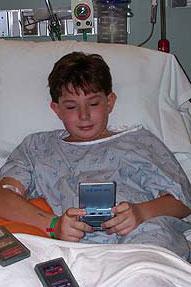You can help your child have the best experience by preparing in advance for his or her procedure. This page lists age-specific tips for ways to reduce and possibly avoid causing anxiety for your child as you prepare for your visit.
Information by age group
- Infants: 0 to 12 months
- Toddlers: 1 to 3 years
- Preschoolers: 3 to 5 years
- School-aged: 5 to 12 years
- Teenagers: 12 to 18 years
For a list of recommended books about illness, medical visits, and other topics for each age range, see the Child Life Program's Websites and Books page.
Infants: 0 to 12 months
Common causes of stress for infants
- Separation from parents
- Unfamiliar caregivers
- Strange sights, sounds, and smells
- New and different routines
- Interrupted sleep
How you can help
- Make sure you and your baby are well-rested.
- Attempt to remain calm; your baby can pick up on your stress.
- During the period when your baby cannot eat, attempt to distract your child by rocking, walking, and comforting him or her.
- Bring a favorite blanket or pacifier to the hospital. It may also be helpful to have a familiar bottle for use after surgery or procedures.
Supporting your child as anesthesia is being started (induction)
- Read a favorite book.
- Listen to music.
- Sing or talk. Simply hearing a familiar voice can be comforting to infants.
We have toys, music, and boys available at the PainFree Program or you can bring items from home.
Additional items to consider bringing
- A car seat or stroller. These are helpful when you are leaving the hospital.
- Formula and bottle (if used), or a favorite sippy cup. Children can typically resume their regular diet after their procedure
Toddlers: 1 to 3 years
When to prepare: Plan to begin preparing your toddler the day before his or her procedure. Preparation too far in advance may increase their anxiety.
Common causes of stress for toddlers
- Being left alone
- Loss of comforts
- Stranger anxiety: contact with unfamiliar people
- Medical equipment
- Restricted movement
How you can help
- Toddlers like to make choices, so offer some whenever possible. For example, have your toddler choose which toy to bring or which shirt to wear.
- Explain who the staff are and what they will do before it happens.
- Provide simple explanations and be careful of your wording. For example, say "The doctor is going to fix your leg." Do not say "The doctor is going to make a cut on your leg."
- Read books with your child about going to the hospital.
Supporting your child as anesthesia is being started (induction)
- Read a favorite book.
- Sing, count, or tell a story.
- Blow bubbles.
- Watch a movie.
- Listen to music.
We have toys, music, movies, and books available at the PainFree Program or you can bring items from home.
Additional items to consider bringing
- Diapers or pull-ups
- An extra set of clothing
- A favorite sippy cup and snack for after the procedure
- A stroller. This is helpful to have when leaving the hospital.
Preschoolers: 3 to 5 years
When to prepare: Plan to begin preparing your preschool-aged child three days before his or her procedure. Preparation too far in advance can increase their anxiety.
Common causes of stress for preschoolers
- Being left alone
- Fear of having a body part damaged
- Fear of needles and shots
- Fear of pain or the anticipation of pain
- Interrupted routines
How you can help
- Explain what the hospital will be like in honest and simple terms, and answer all questions. For example, if asked about pain, explain to your child: "Yes it will hurt, but not for long."
- Explain to your child why he or she is having the scheduled procedure. Preschoolers often feel they have done something wrong and surgery is their punishment for being "bad."
- Choices can increase your child's sense of control, so offer them when appropriate and possible.
- Have your child tour the facility prior to the procedure. We offer a Sneak-a-Peek tour for surgery.
- Read books with your child about going to the hospital.
Supporting your child as anesthesia is being started (induction)
- Read a favorite book.
- Sing, count, or tell a story.
- Blow bubbles.
- Watch a movie.
- Listen to music.
We have toys, music, movies, and books available at the PainFree Program, or you can bring items from home.
Additional items to consider bringing
- Pull-ups or extra underwear and clothes
- A stroller. This is helpful to have when leaving the hospital.
School-aged: 5 to 12 years
When to prepare: Plan to begin preparing your child one week before his or her procedure. Preparation too far in advance can increase their anxiety.
Common causes of stress for school-aged children
- Loss of control
- Fear of pain or the anticipation of pain
- Fear of needles and shots
- Fear of waking up during surgery
How you can help
- Make sure your child knows why he or she is having surgery. School-aged children may feel they have done something wrong and surgery is their punishment for being "bad."
- Explain the benefits of your child's surgery. For example, "After your arm has healed, you will be able to play baseball again."
- Choices can increase your child's sense of control, so offer them when appropriate and possible.
- Ask your child to explain back to you what is going to happen at the hospital. This can help you learn whether or not your child has a clear understanding of what to expect.
- Have your child tour the facility prior to his or her surgery. We offer a Sneak-a-Peek tour for surgery.
- Let your child know it is okay to be afraid and to cry.
- Because school-aged children have a great deal of imagination, be sure to talk to them honestly. Encourage your child to ask questions and provide honest answers to eliminate misunderstanding.
- Read books with your child about going to the hospital.
Supporting your child as anesthesia is being started (induction)
- Read a book or tell a story.
- Sing or listen to music.
- Tell jokes
- Use guided imagery or thinking of a “happy” or “vacation” place.
- Watch movies or play video games.
- Play I Spy games
We have toys, music, movies, and books available at the PainFree Program, or you can bring items from home.
Additional items to consider bringing
- Change of clothing/underwear
Teenagers: 12 to 18 years
When to prepare: Teens often appreciate being treated as active participants in decision-making. You and your teen can begin learning and preparing as soon as the decision to have the procedure is made.
Common causes of stress for teenaged children
- Loss of control
- Change in appearance
- Fear of surgery and its risks
- Fear of pain
- Fear of dying during surgery
- Fear of the unknown
- Concern with body image
How you can help
- Respect your teen's need for privacy, and his or her concern about body image.
- Talk openly and frequently about what is going to happen.
- Teenagers are often uncomfortable admitting they do not understand. Parents and healthcare professionals may need to explain the procedure and treatment several different ways to help a teen fully understand and become more comfortable.
- Encourage teens to bring a few comfort items from home, such as books, tablets, phone, games, music, soft blankets, slippers, or a favorite pillow.
- Be truthful in answering questions. Teens can become angry if they feel they are being lied to.
- Have your teen tour the facility prior to surgery. We offers a Sneak-a-Peek tour for surgery.
- Have your teen read about going to the hospital or having surgery.
Supporting your teen as anesthesia is being started (induction)
- Read a book.
- Sing or listen to music.
- Tell jokes.
- Use guided imagery or thinking of a “happy” or “vacation” place.
- Watch movies or play video games.
- Play I Spy games.



